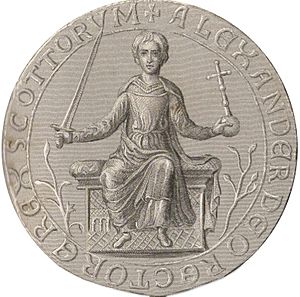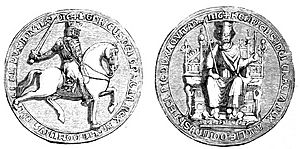Treaty of York facts for kids
| Scriptum cirographatum inter Henricum Regem Anglie et Alexandrum Regem Scocie de comitatu Northumbrie Cumbrie et Westmerland factum coram Ottone Legato | |
|---|---|
| Signed | 25 September 1237 |
| Location | York |
| Signatories | |
| Language | Latin |
The Treaty of York was an important agreement. It was signed between two kings: Henry III of England and Alexander II of Scotland. They met in the city of York on September 25, 1237.
This treaty officially stated that areas like Northumberland, Cumberland, and Westmorland belonged to England. These regions included what is now County Durham. The agreement set the Anglo-Scottish border. This border has stayed almost the same ever since. Only small changes have happened over time. The treaty also sorted out other issues between the two kings. It marked the end of Scotland's attempts to expand its land southwards.
The Treaty of York was one of many agreements. These agreements helped manage the relationship between the two kings. A special church official, called a papal legate, was in England at the time. His name was Otho of Tonengo. King Henry had asked him to come for a church meeting in London. Henry told Otho about the meeting in York beforehand. Otho attended the signing of the treaty. A writer from that time, Matthew Paris, wrote about this meeting.
What the Treaty Agreed To

King Henry and King Alexander often made agreements. They also had family ties. Alexander was married to Henry's sister, Joan. Alexander's sister, Margaret, had married Hubert de Burgh. Hubert used to be a helper for young King Henry.
On August 13, 1237, Henry told Otho he would meet Alexander in York. Their goal was to discuss peace. They reached an agreement on September 25. It covered "all claims" up to that date.
The full name of the agreement was very long. It was called Scriptum cirographatum inter Henricum Regem Anglie et Alexandrum Regem Scocie de comitatu Northumbrie Cumbrie et Westmerland factum coram Ottone Legato. Here are the main points of the agreement:
- The King of Scotland agreed to give up his claims. He gave up his family rights to Northumberland, Cumberland, and Westmorland. He also gave up a claim for 15,000 marks of silver. This money was paid by an earlier Scottish King, King William, to King John. The original agreements for that money were not kept. Alexander also freed Henry from agreements about marriages. These were for Henry and Richard to marry Alexander's sisters.
- The King of England gave land to Scotland. Henry gave Alexander certain lands in Northumberland and Cumberland. Alexander and future Scottish kings would hold these lands. They would hold them under a special type of ownership called "feudal tenure." This meant they had certain rights. They were free from some common feudal duties. The Scottish Steward (a high-ranking official) would handle some legal issues. These rights would also pass down to the Scottish King's heirs. For these lands, the King of Scotland would not have to go to an English court.
- The King of Scotland showed his loyalty. Alexander promised his loyalty and service for the lands mentioned. This was called "homage and fealty."
- Both kings respected old agreements. They agreed to respect any previous written agreements. This was true as long as they did not conflict with this new treaty. Any old documents about the counties were to be returned to the King of England.
This treaty was the first time the border was officially set. Both sides agreed to it.
What Matthew Paris Wrote
A famous writer named Matthew Paris (who lived from about 1200 to 1259) wrote about this treaty. Paris was known for writing with strong feelings. He often criticized people he disagreed with.
Paris described the Papal legate Otho in a negative way. He said Otho was weak when facing strong people. But he was bossy when he had power over others. Paris also said Otho was greedy and collected a lot of money.
Paris wrote that Alexander and Henry disliked each other in 1236. He said Alexander even threatened to invade England. Paris described the 1237 meeting in York. He said Henry and Otho invited Alexander. When Otho said he wanted to visit Scotland, Alexander supposedly refused. He claimed no legate had ever visited Scotland. He said he would not allow it. Alexander also warned Otho to be careful if he did enter Scotland. Paris later wrote that in 1239, Otho was leaving for Scotland. He said that Alexander had been so angry about Otho's possible visit in 1237. This anger was so strong that a written agreement had to be made about Otho's visit.
See also
- Treaty of York (1464)
- List of treaties
 | Lonnie Johnson |
 | Granville Woods |
 | Lewis Howard Latimer |
 | James West |


